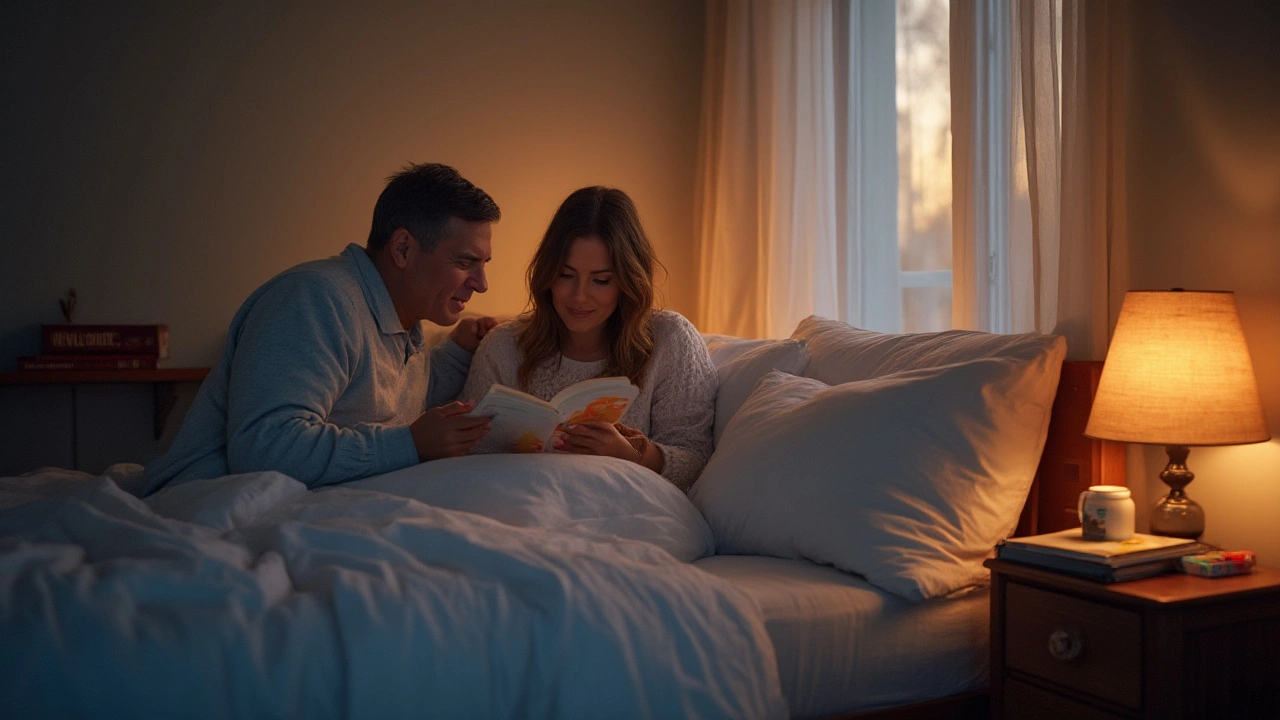You hear it whispered in waiting rooms and see the worried faces in online forums—statins might sneak into your nights and mess with your sleep. Maybe you’re one of the countless people who started cholesterol-lowering meds and suddenly found yourself tossing, turning, and clock-watching more than usual. The weird part? Doctors rarely mention sleep trouble right away, even though reports keep popping up everywhere. What’s real, what’s rumor, and most importantly—how can you get better rest while protecting your heart?
How Statins Can Shape Your Sleep
Statins like atorvastatin, simvastatin, and rosuvastatin have a solid reputation for slashing heart attack risk. But a surprising number of people say their sleep goes haywire soon after starting. While some studies say the insomnia rate with statins is low, real people tell a different story. Research published in the journal "Pharmacology" in 2023 linked certain statins, especially simvastatin, to disrupted sleep cycles. The most common complaints? Waking up in the middle of the night, restless legs, bizarre dreams, or just plain being unable to drift off.
Why does this happen? Statins are fat-soluble, so several cross the blood-brain barrier and can mix with the way your brain makes hormones connected to sleep. Melatonin, the hormone that helps control your sleep-wake cycle, seems to dip after starting statins for some people. Others report muscle aches, cramping, or night sweats—none of which make for quality shuteye. The kicker: these side effects don’t always show up right away. Some people don’t feel a thing for weeks.
The good news is, sleep issues aren’t "all or nothing." A few simple shifts in how you take your meds or handle your evenings can help you sidestep the worst of it. The key is not to panic or ditch your statin—just get curious and start experimenting.
Timing Is Everything: When to Take Your Statin
The bottle usually says, "Take once daily." That nonchalant advice can leave you stuck sleepless at 2 a.m. Turns out, the time you swallow your statin can influence how it dances with your sleep schedule. Most statins work by blocking an enzyme (HMG-CoA reductase) that peaks at night. But modern versions like atorvastatin and rosuvastatin are long-acting, so the time of day you take them matters less for cholesterol and way more for side effects.
If sleep is your enemy, try switching your statin to the morning. Real-world evidence suggests about 60% of people who moved their dose earlier reported better sleep and fewer vivid dreams. Just make the switch after talking to your doctor—some brands might still advise nighttime dosing based on your specific health situation.
Looking for stats? A 2024 sleep clinic survey showed 1 in 5 insomnia cases among statin users improved within two weeks after moving their medication to breakfast time. It’s practical, low-risk, and approved by sleep medicine specialists from the American Academy of Sleep Medicine. Want a deep-dive guide? The article at statin insomnia breaks down the nuances between brands, and the subtle timing effects for different statins.
Two important reminders: always stay consistent with your chosen time, and never double-dose to "catch up" if you miss one. That can stress your liver and make other side effects worse. If you’re night owl or a shift worker, syncing your statin dose with your "real morning" works best, even if your day starts at 3 p.m.

Lifestyle Tweaks That Really Make a Difference
So much focus falls on the pill in your hand. But everything else you do during the day (and leading up to bedtime) can nudge your sleep back on track when statins are being stubborn. Here’s where tweaks feel almost magical:
- Cut caffeine after lunchtime. Statins and caffeine both zap your REM sleep if they stack up late in the day.
- Get 20-30 minutes of bright daylight exposure early on. This boosts melatonin production at night, even if your statin tries to dip it.
- Tune down screens and blue light 1-2 hours before bed. Blue light delays melatonin and can amplify statin-related sleep issues.
- If muscle cramps and aches wake you up, try a gentle stretching routine or warm bath before tucking in. Magnesium supplements (Talk to your doc first!) sometimes help, too.
- Keep your bedroom cool (around 65°F to 68°F). Statin users are more likely to report disrupted sleep if they overheat.
Sleep trackers seem to tell the full story, but be cautious—too much obsessive tracking can make insomnia worse. Instead, jot down simple notes before bed: "Took statin at 7 a.m. Slept well." Over time, you’ll see trends emerge.
Here’s an eye-opening stat: About 30% of people with statin-related insomnia also drink alcohol in the evening. Alcohol might knock you out faster, but it messes with REM sleep and amplifies the statin’s side effects for the rest of the night. Try skipping it for a week and see how you feel.
What to Do If Side Effects Persist
If you’ve tried morning dosing, tweaked your habits, and your nights still feel restless, don’t throw in the towel. Go back to the drawing board with your doctor or pharmacist in tow. For some, it’s as simple as switching to a hydrophilic statin, like pravastatin or rosuvastatin, which seem less likely to cross into the brain and cause sleep drama. Others find that a lower dose gets the job done without impacting their sleep cycle. Never change your dose—higher or lower—without running it past your healthcare provider.
There’s also the option of alternate-day dosing, which is gaining traction in recent clinical guidelines for statin-sensitive people. Some statins, such as rosuvastatin, can be effective with this schedule. One European clinic published a table showing people on alternate-day dosing reported 50% fewer sleep complaints than their daily counterparts:
| Group | Insomnia Rate |
|---|---|
| Daily Dosing | 28% |
| Alternate-Day Dosing | 14% |
Don’t forget to mention every symptom, not just sleep struggles. Night sweats or odd dreams might sound trivial, but they’re clues your provider needs. Mental health matters too. Anxiety and statins can sometimes fuel each other—so don’t hesitate to mention any mood changes alongside your sleep updates.

When Medical Help Is a Must
Most statin-related sleep issues simmer down with a few smart tweaks and a little patience. But some people get hit with serious or persistent side effects: relentless muscle pain, total insomnia, vivid nightmares, or a huge dip in mood. If any of these start up—or if your sleep loss spirals into exhaustion, brain fog, or emotional swings—reach out to your healthcare provider right away.
Rarely, statins can cause more severe problems like rhabdomyolysis (muscle breakdown) or significant liver changes, both of which sometimes show up as weird sleep changes, fatigue, or a "never-rested" feeling. While these are rare—less than 1% of users—you want to catch them early.
If your sleep stays rocky for more than two weeks despite fixes, you might be dealing with another underlying issue unrelated to your statin. Sleep apnea, restless legs, or hormone changes can all mimic statin insomnia. Honest, complete updates with your provider get to the root cause quicker—and let you keep the heart benefits your statin delivers.
Here’s the most important thing: Don’t quit your statins cold-turkey to try to fix your sleep. Stopping suddenly can send cholesterol and cardiovascular risks soaring fast. If you ever miss a dose, just take it at your next scheduled time and keep tracking those sleep shifts. Together, you and your provider can craft a plan that calms your nights while keeping your heart in fighting shape.
